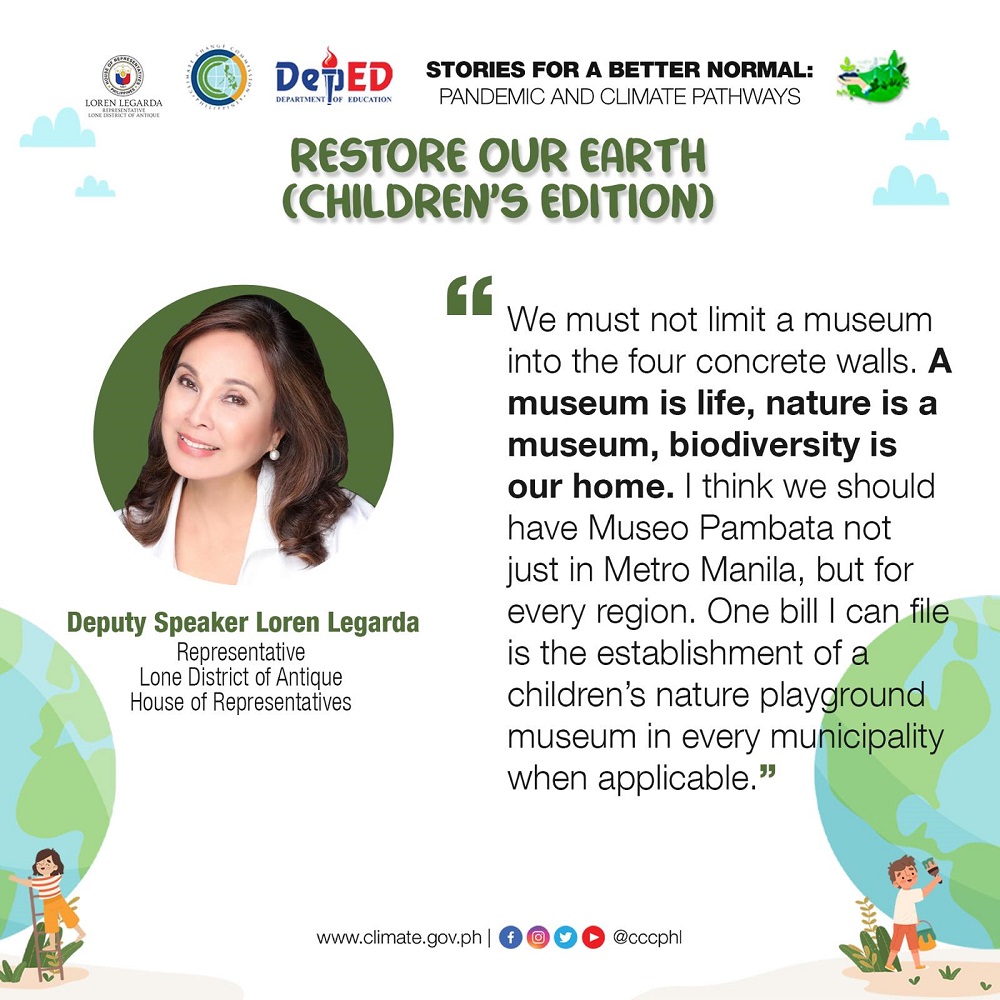
July 17, 2021 Saturday

MANILA, 18 July 2021 — The 53rd episode of “Stories for a Better Normal: Pandemic and Climate Pathways” featured administrators of museums, farms, and institutions that provide children with rich and instinctive environmental learning and encourage families to engage more with nature-based activities amid the pandemic.
The online conversation conceptualized and hosted by three-term Senator, now Deputy Speaker and Antique Representative Loren Legarda featured managers of children recreational facilities including Bambi Mañosa-Tanjutco, President of Museo Pambata, with daughters Isabella and Natasha Tanjutco of Kids for Kids; Edeline Payawal, Manager of Hiraya Childhood Playfarm; and Sharon Cortez, Founder of Forest School Philippines.
Bambi Mañosa-Tanjutco, with daughters Isabella and Natasha, shared how Kids for Kids work with Museo Pambata, and how they are advocating for children’s rights by creating safe spaces for them.
“We saw that the world is now evolving, and it’s either people adapt or we will get left behind. So, it’s important that we do adapt because the future for children – we are 100% of tomorrow and so we should really be involved in creating that safe environment for children to thrive in,” said Isabella Tanjutco.
“Our dream is, we would like Museo Pambata to be the leading youth hub in the country that would amplify the voice of the youth and generations of Filipino gamechangers. We would like to breed these kinds of people and I think the future of kids is so important [since] they will be the leaders of tomorrow. We put that in our hearts, we plant the seeds today, and they will be the adults that we will look upon tomorrow,” said Bambi Mañosa-Tanjutco.
Payawal showed how they developed Hiraya Childhood Play Farm, an open space where families can have the freedom to move, explore and connect with nature. The guests can reconnect with their inner child and re-live their treasured childhood memories. The farm also enables children to learn about farm life and rural living.
“Since we’re kids, we grew up in the province. Nae-enjoy namin yung simpleng buhay, mga simpleng laro. When we got older, when adulting gets to you and life becomes more complicated, more stressful, and there’s more pressure, there’s also more appreciation when it comes to the simple life, and also more appreciation of your childhood, your past. We started dreaming of having a space of our own, for our family, and also for our kids. We wanted to create a version of a world we want to live in,” said Payawal.
Cortez put emphasis on the role of the environment in shaping the future of today’s children.
“Ang mga karanasan nila mula sa pagkabata ay mahalaga kung paano sila makikipagsalamuha sa kalikasan, sa kanilang paglaki. Kaya po sa Forest School Philippines, and hangad po namin ay maranasan ng mga bata ang nature connectedness. Ayon sa saliksik, ‘Adult environmentalism have been shown to derive from deep and positive childhood experiences in nature,’” said Cortez.
Legarda then reiterated the importance of interacting with the natural world, especially with the children that are mostly affected by pandemic as their learning are only limited with gadgets, making them slowly disconnected from nature.
“We must not limit a museum into the four concrete walls. A museum is a life, nature is a museum, biodiversity is our home. I think we should have Museo Pambata not just in Metro Manila, but for every region. One bill I can file is the establishment of a children’s nature playground museum in every municipality when applicable,” said Legarda.
As an online discussion to promote health, environmental consciousness, and climate-adaptive practices, "Stories for a Better Normal" aims to change the mindset of individuals, families, and communities by demonstrating ways in which a ‘better normal’ can be realized within our communities.
This online discussion is organized in partnership between the Office of Deputy Speaker Legarda and the Climate Change Commission, with support from the Department of Education, Philippine Information Agency, Institute for Climate and Sustainable Cities, The Climate Reality Project-Philippines and Mother Earth Foundation.